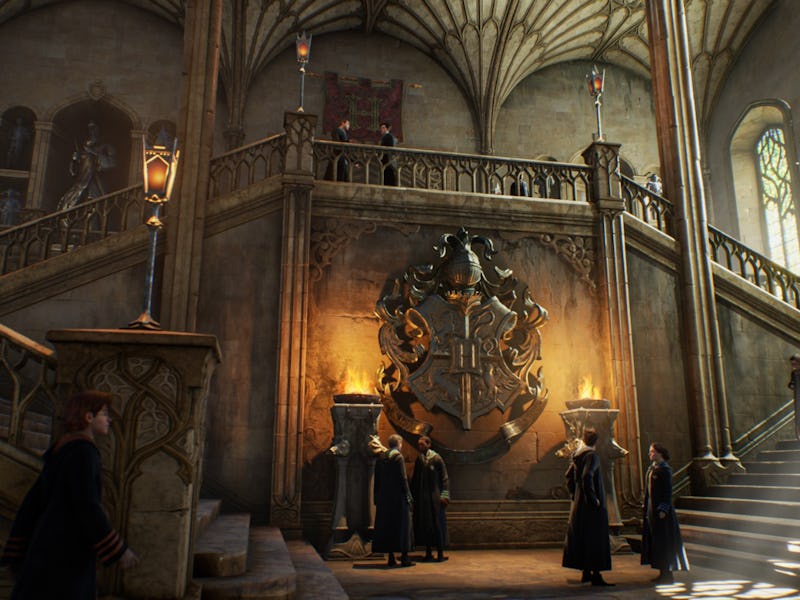Hogwarts Legacy's future could look a lot like Marvel's Avengers
Warner Bros. wants to get into live service games, but it'll take serious work.

Warner Bros. is betting big on live services games. That at least seems to be the case judging by a recent internship listing that went up on the company’s website, which emphasizes the interactive division has a “heavy focus on live service.” That means that games like Hogwarts Legacy could take a Destiny 2 approach to ongoing content that keeps people hooked over a long period of time with daily, weekly, and even seasonal tasks.
If Warner Bros. is going to successfully enter the live service arena, it's going to need to take some lessons from some major games that failed at doing the same. That means learning from one of 2020's biggest bombs: Marvel’s Avengers.
For the uninitiated, here’s a quick refresh on gaming’s live service model. Unlike traditional titles that offer the bulk of their content upfront, live service games are built to have a longer lifespan by bringing frequent updates over the course of years. Games like that can be a slam dunk, giving studios the kind of sustained player engagement that they can only dream of. They can just as easily be lead balloons that launch with a resounding thud. That’s where Marvel’s Avengers comes in.
Square Enix’s attempt to capitalize on the success of Marvel’s universe of superheroes didn’t quite go as planned. While buzz was positive for the game’s short story campaign, its long-term vision left many underwhelmed by repetitive gameplay. There was plenty of gear to chase (and cosmetic items to buy), but few activities felt worth repeating over a long period of time. And there wasn't enough variety to keep things fresh. Even during the game’s beta, fans were already wary of how light the endgame potential felt.
Ms. Marvel punches an enemy in Marvel's Avengers.
It didn’t help that the game launched with several bugs, forcing the developers to kick their plans for free updates down the road. The game launched in September and didn’t get its first major update until December. By that point, the player base had fallen off significantly and the game failed to recoup its development costs.
It isn’t just Avengers that’s fallen victim to the live service carrot either. Fallout 76 and Anthem suffered similarly disappointing launches that turned a hopeful gamble into an uphill struggle to retain players. Following a few rocky years of releases like that, it seemed like game studios might change course and figure out more consistent ways to hook players instead of chasing a risky dream.
Warner Bros. is making it clear that it thinks there’s still some gas left in that tank. It’s entirely possible that it could succeed where many others have failed, but Warner Bros. will need to set realistic expectations upfront to win players over.
Crucible multiplayer in Destiny 2 at launch.
Live service game creators tend to serve up lofty promises prior to launch that they can’t keep. During the hype tour for the original Destiny, Bungie painted the looter shooter as something fans would be playing for 10 years. That set the stage for disappointment when players ran out of things to do within a few months. A marketing selling point quickly became a liability.
The reality is that developers will never be able to keep up with dedicated fans who plow through content at light speed. The promise of continued support is always going to be one that’s too difficult to deliver. As Avengers showed us, there just isn’t always enough time or resources to balance both new content and necessary bug fixes. If fans are always expecting something new, it doesn’t leave a lot of flexibility to tweak the experience based on community feedback.
Rather than using live service as a carrot on a stick for hungry players, Warner Bros. needs to focus on making content that’s satisfying on day one and setting up a realistic roadmap that takes the unforeseen quality-of-life fixes into account. That means a focus on fun, replayable activities that fans will play regardless of the long-term benefit. Hogwarts Legacy can include tons of fun wizard abilities, but it won’t matter much if people don’t actually want to play the game once they unlock them.
That idea is especially true when it comes to microtransactions. Live service games tend to go heavy on cosmetics players can purchase with real money, hoping to lure dedicated fans into a buying cycle. It seems like an easy way to fish for whales, but it’s far from a surefire bet. Special gear is only worth buying when players feel like they’ll have plenty of chances to show it off. If the user base plummets, who cares if your broom lights up?
The reality is that live service games sound like an easy way to monetize, but they’re an incredibly complex beast to tackle. Many major studios simply end up feeling underprepared when their games launch and Marvel’s Avengers stands as an unfortunate cautionary tale. If Warner Bros. is serious about trying that approach out, it needs to have a flexible plan, be ready to swiftly react to community feedback, and, above all else, deliver a game that’s fans actually want to play.
If it can nail that, fans will view Warner Bros. as a Gryffindor. Fail and it’ll be a total Slytherin.
Hogwarts Legacy is currently scheduled for release in 2022.